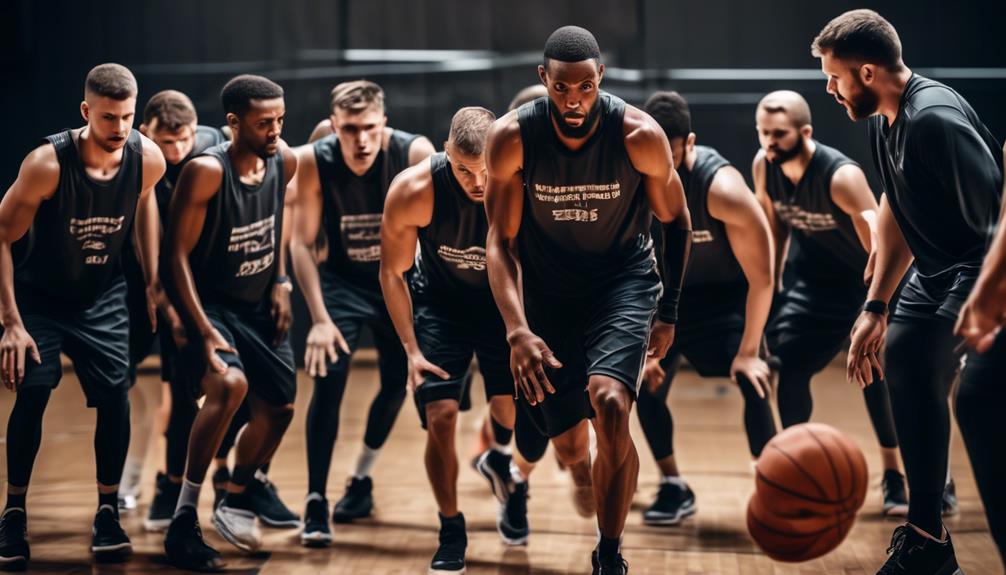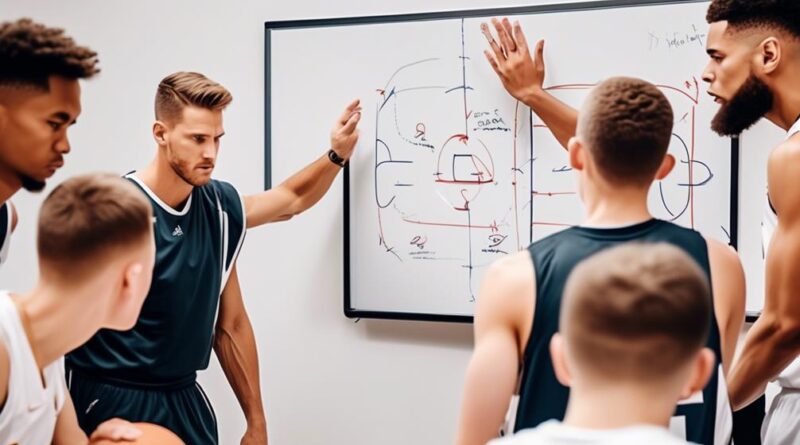What Basketball Coaching Strategies Boost Team Performance?
You may think that coaching strategies can only take a basketball team so far, but the truth is that they can make all the difference between an average performance and a winning season.
From effective communication with players to implementing game plans that capitalize on player strengths, there are numerous strategies that can significantly boost team performance on the court.
But what are these strategies, and how can they be effectively implemented to bring out the best in your players?
Importance of Coaching Strategies
Effective coaching strategies are essential for optimizing team performance and achieving success on the basketball court. Motivating players is a crucial aspect of coaching that directly impacts the team's performance. As a coach, you must understand that each player has different motivational triggers. By taking the time to understand what drives each individual, you can tailor your approach to inspire and energize them. Whether it's recognizing their achievements, providing constructive feedback, or setting achievable goals, your ability to motivate players is pivotal.
Time management is another key component of effective coaching. Balancing practice sessions, game preparation, and individual player development requires careful planning and organization. You must prioritize tasks, allocate sufficient time for skill development, and ensure that the team is well-prepared for upcoming games.
Additionally, managing players' time effectively is equally important. Understanding their academic commitments, personal schedules, and physical well-being can help you create a balanced and sustainable training regimen.
Effective Communication With Players
Encouraging open and honest dialogue with your players is essential for fostering a strong and cohesive team dynamic. Effective communication with your players is crucial for enhancing player motivation and promoting team cohesion.
Here are some key strategies to help you communicate more effectively with your team:
- Active Listening: Take the time to actively listen to your players. By showing genuine interest in their thoughts and concerns, you can create a supportive environment where players feel valued and understood. This can significantly boost their motivation and commitment to the team.
- Clear and Consistent Feedback: Providing clear and consistent feedback is vital for player development. Be specific in your feedback, highlighting both areas of improvement and strengths. This helps players understand their roles within the team and fosters a sense of unity and purpose.
- Open Door Policy: Establishing an open door policy encourages players to voice their opinions, share ideas, and address any issues they may have. This open line of communication not only builds trust but also strengthens team cohesion by creating a culture of transparency and inclusivity.
Developing Tactical Skills
How can you effectively enhance your team's tactical skills for improved on-court performance?
Skill development is crucial for elevating your team's game. It involves honing individual and collective abilities, such as shooting, passing, and defensive maneuvers, to execute game tactics effectively. Tactical awareness and strategic decision making are essential components of skill development. Encouraging your players to understand the nuances of the game and make quick, effective decisions on the court is key to success.
To develop tactical skills, incorporate specific drills and exercises into your training sessions. Focus on scenarios that mirror real-game situations, such as fast breaks, defensive rotations, and offensive sets. By repeatedly practicing these scenarios, players can enhance their tactical awareness and decision-making abilities.
Additionally, emphasize the importance of understanding opponents' strategies and adapting to them during games. This entails analyzing opponents' strengths and weaknesses, and developing counter strategies to exploit their vulnerabilities.
Furthermore, encourage open communication and collaboration among players to enhance their strategic thinking. Players who understand each other's strengths, tendencies, and decision-making processes can elevate the team's overall tactical acumen. By fostering an environment where players actively discuss and contribute to developing game tactics, you can cultivate a team that's well-versed in strategic decision making.
Building Team Chemistry
To foster strong team chemistry, integrate the tactical skills developed in training sessions into cohesive on-court interactions and collective decision-making processes. Team chemistry is crucial for success on the basketball court. It involves team bonding and trust building, which can significantly enhance overall performance and cohesion.
Here's how to build team chemistry effectively:
- Encourage Open Communication: Create an environment where players feel comfortable expressing their thoughts and ideas. Encouraging open communication fosters trust and understanding among team members, leading to stronger team chemistry.
- Organize Team-Building Activities: Engage in team-bonding exercises and activities outside of regular practice sessions. This could include team dinners, group outings, or community service projects. These activities can help players develop a deeper connection and understanding of one another, ultimately strengthening team chemistry.
- Foster a Supportive Environment: Emphasize the importance of supporting each other both on and off the court. Players who feel supported by their teammates are more likely to trust one another, leading to improved team chemistry and a more cohesive unit.
Utilizing Player Strengths
Leverage the unique strengths of each player to enhance overall team performance and strategic effectiveness on the basketball court. Recognizing and capitalizing on individual abilities is crucial for achieving success as a team.
Skill development plays a significant role in utilizing player strengths. As a coach, it's essential to assess each player's skills and work with them to further develop and refine these abilities. By focusing on skill development tailored to individual strengths, you can elevate the overall performance of the team.
Moreover, individual motivation is a key component in utilizing player strengths. Understanding what drives each player and tapping into their personal motivations can lead to enhanced performance on the court. As a coach, taking the time to communicate with each player and understanding their unique motivators can be instrumental in leveraging their strengths for the benefit of the team.
Whether it's setting personal goals, providing constructive feedback, or offering encouragement, individual motivation plays a pivotal role in maximizing player strengths.
Implementing Effective Game Plans
When implementing effective game plans, consider the strengths and weaknesses of your team to maximize strategic performance on the basketball court. Game preparation and scouting are crucial components of effective game plans. Understand the strengths and weaknesses of your opponents to exploit their vulnerabilities and capitalize on your team's advantages. In-depth scouting allows you to tailor your game plan to counter the opposing team's strategies and tendencies.
In game adjustments and flexibility are essential for executing effective game plans. Basketball is a dynamic sport, and the ability to adapt your game plan based on the flow of the game and the performance of your players is paramount. Being able to make quick decisions and adjustments during the game can often be the difference between winning and losing. Flexibility in your game plan enables your team to respond to unexpected situations and challenges on the court.
Effective game plans also require clear communication and buy-in from your players. Ensure that your team understands the game plan and their roles within it. Encourage open communication and feedback from your players to make necessary adjustments as the game progresses. Building a sense of collective ownership of the game plan fosters a cohesive and focused team effort.
Enhancing Player Conditioning

Enhancing player conditioning is imperative for executing effective game plans on the basketball court, as it directly impacts your team's ability to maintain peak performance throughout the game. Injury prevention is crucial in ensuring that your players are in optimal condition to contribute to the team's success. Emphasizing proper nutrition plays a vital role in injury prevention, as it helps in strengthening bones and muscles, reducing the risk of injuries during intense gameplay. Encourage your players to maintain a well-balanced diet, rich in essential nutrients, to support their overall health and physical well-being.
Furthermore, endurance training is essential for enhancing player conditioning. Implementing regular endurance training sessions will help your team build stamina, allowing them to perform consistently at high levels throughout the game. Endurance training also aids in improving cardiovascular health, which is vital for enduring the physical demands of basketball.
In addition to endurance training, incorporating effective recovery techniques is paramount. Encourage your players to prioritize adequate rest, proper hydration, and post-game recovery routines to facilitate muscle recovery and reduce the risk of fatigue-related injuries.
Evaluating and Adjusting Strategies
To continuously improve your team's performance, regularly evaluating and adjusting your coaching strategies is essential. This process involves strategy analysis and performance adjustment to ensure that your team is constantly evolving and adapting to the demands of the game.
Here are some key steps to effectively evaluate and adjust your coaching strategies:
- Game Analysis: After each game, take the time to review and analyze the strategies that were employed. Look at what worked well and what didn't. Identify patterns in performance and assess whether the strategies were effectively executed by the team.
- Player Feedback: Engage in open communication with your players to gather their insights on the effectiveness of the strategies. Understanding their perspectives can provide valuable input for making necessary adjustments.
- Opponent Assessment: Continuously assess the strengths and weaknesses of upcoming opponents. This will help in tailoring your strategies to exploit the weaknesses of the opposing team while mitigating their strengths.
Frequently Asked Questions
How Can Coaches Use Data and Analytics to Inform Their Coaching Strategies?
You can use technology, data, and analytics to inform coaching strategies. Improving decision making through statistical analysis allows for better understanding of player performance and team dynamics, leading to more effective coaching and game plans.
What Are Some Common Challenges Coaches Face When Implementing New Coaching Strategies?
When implementing change, coaches often face challenges in gaining buy-in from players and maintaining team motivation. It's crucial to communicate the benefits of new strategies and foster a positive team environment to overcome these obstacles.
How Do Coaches Balance the Need for Individual Player Development With Team Success?
To balance individual player development with team success, you motivate players to improve their skills while emphasizing the importance of teamwork. By fostering individual growth and cultivating team cohesion, you create a winning formula for overall team performance.
What Role Does Sports Psychology Play in Coaching Strategies and Team Performance?
When coaching basketball, sports psychology and mental conditioning are crucial. Your communication and motivation strategies directly impact team performance. Understanding and leveraging the psychological aspects of the game can greatly enhance your coaching strategies and player development.
How Can Coaches Adapt Their Strategies to Different Playing Styles and Opponents?
To adapt your coaching strategies to different playing styles and opponents, consider player dynamics and team chemistry. Study opponent strategies and adapt styles accordingly. Encourage open communication and flexibility to maximize team performance.
Conclusion
So, as a basketball coach, it's crucial to:
- Communicate effectively
- Develop tactical skills
- Build team chemistry
- Utilize player strengths
- Implement game plans
- Enhance player conditioning
- Continuously evaluate and adjust your strategies.
By doing so, you can boost your team's performance and lead them to success on the court.
Keep honing your coaching strategies and watch your team excel.
